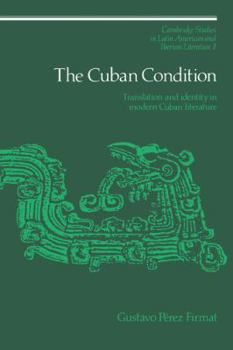The Cuban Condition: Translation and Identity in Modern Cuban Literature (Cambridge Studies in Latin American and Iberian Literature)
Select Format
Select Condition 
Book Overview
The sense of the radical newness of Spanish America found in literary works from the chronicles of the conquest to the work of the criollistas has more recently given way to a stronger recognition of the transatlantic roots of much Spanish-American literature. This indebtedness does not imply subservience; rather, the New World's cultural and literary autonomy lies in the distinctive ways in which it assimilated its cultural inheritance. Professor P rez Firmat explores this process of assimilation or transculturation in the case of Cuba, and proposes a new understanding of the issue of Cuban national identity through revisionary readings of both literary and non-literary works by Juan Marinello, Fernando Ortiz, Nicolds Guill n, Alejo Carpentier and others, dating from the early decades of the twentieth century, a time of intense self-reflection in the nation's history. Using a critical vocabulary derived from these works, he argues that Cuban identity is translational rather than foundational and that cuban a emerges from a nuanced, self-conscious recasting of foreign models.
Format:Paperback
Language:English
ISBN:0521027322
ISBN13:9780521027328
Release Date:November 2006
Publisher:Cambridge University Press
Length:196 Pages
Weight:0.65 lbs.
Dimensions:0.5" x 6.0" x 9.0"
Customer Reviews
0 rating





